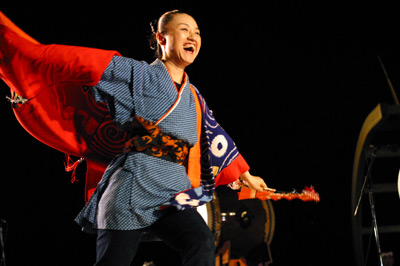Performer: SHOJI KAMEDA
 SHOJI KAMEDA is one of North America's most gifted young taiko performers. His musical training began at the age of 8 when he joined Shasta Taiko one of the first children's taiko groups. In his 21 years of experience he has performed and recorded with groups throughout the United States and Japan. Beginning in 2000, Kameda spent two years in Tokyo studying traditional Japanese drumming with masters in edo bayashi, hogaku hayashi and kumidaiko.
SHOJI KAMEDA is one of North America's most gifted young taiko performers. His musical training began at the age of 8 when he joined Shasta Taiko one of the first children's taiko groups. In his 21 years of experience he has performed and recorded with groups throughout the United States and Japan. Beginning in 2000, Kameda spent two years in Tokyo studying traditional Japanese drumming with masters in edo bayashi, hogaku hayashi and kumidaiko.In 2002 Kameda co-founded the On Ensemble with fellow taiko artists Kristofer Bergstrom, Michelle Fujii and Masato Baba. That year On Ensemble was awarded the Duane Ebata Memorial Award "in support and recognition of emerging artists of promise who are furthering the development of Asian Pacific American Performing Arts." In 2005 the ensemble's first CD "Dust and Sand" was met with critical acclaim, and spent several months on the New Age Reporter top 10 chart. In 2006 Kameda was selected through a highly competitive process as an Asian Pacific Performance Exchange fellow, spending six weeks at UCLA's Center for Intercultural Performance, collaborating with master arts from the Philippines, India, Indonesia, Malaysia, Thailand and the USA.
As a freelance musician Kameda performs and records with pioneering Asian American jazz fusion band Hiroshima and is a sought after workshop leader and composer. Most recently he completed an original score for "Abduction: The Megumi Yokota Story" which won the Audience Award for Best Documentary at the 2006 Slamdance Film Festival.






